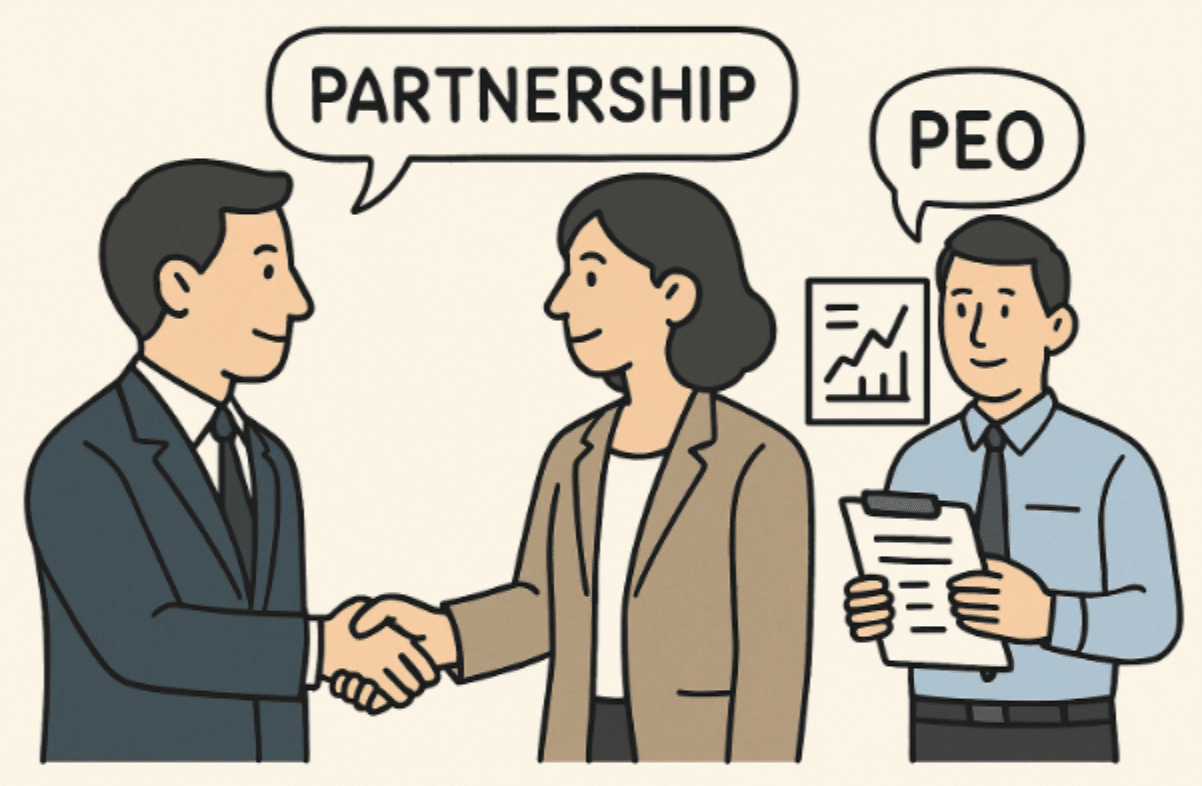Table of Contents
- What Is a Professional Employer Organization (PEO)?
- How PEOs Fit Into the Business Landscape
- Core Services Provided by PEOs
- PEO vs. Traditional HR Outsourcing
- Key Considerations in Selecting a PEO Partner
- Conclusion: When a PEO Makes Sense
What Is a Professional Employer Organization (PEO)?
A Professional Employer Organization, or PEO, is a firm that enables businesses to outsource essential human resource functions such as payroll, employee benefits, compliance, and HR support. In a typical PEO arrangement, a small or midsize business establishes a co-employment relationship with the PEO. This structure enables the PEO to manage many of the administrative and regulatory burdens, allowing owners and operators to focus more on core business strategies rather than complex HR tasks. For a more in-depth look at the PEO definition and uses, ADP offers additional guidance. Partnering with a PEO allows businesses to delegate key HR and administrative tasks—such as payroll, benefits management, and regulatory compliance—while maintaining control over daily operations. PEOs also support onboarding, tax filings, and employee relations, providing expertise that many growing companies lack in-house. This partnership reduces administrative burdens, enhances compliance, and offers competitive employee benefits, making it a strategic solution for businesses aiming to scale and attract talent.
How PEOs Fit Into the Business Landscape
The modern business environment has seen a significant rise in outsourced HR solutions, primarily driven by the need for efficiency and regulatory compliance. Outsourcing HR functions via a PEO is particularly attractive to small and midsize businesses that may not have the resources or expertise to manage complex HR tasks internally. These organizations benefit from the economies of scale and risk-sharing features PEOs bring to the table.
Companies in rapid-growth sectors, those expanding into new markets, or businesses managing a distributed workforce typically benefit most from PEO partnerships. Startups, technology firms, manufacturing companies, retail operations, and professional services providers often use PEOs to remain agile and compliant as their organizational needs shift.
Core Services Provided by PEOs
PEOs manage comprehensive payroll administration and compliance, taking full responsibility for the often complex and time-consuming payroll process. This includes accurately calculating wages, ensuring timely direct deposits, and preparing all necessary reports to meet regulatory requirements. By handling these tasks, PEOs relieve businesses of the intricate challenges of payroll management, including the risk of costly errors or penalties associated with miscalculations, missed deadlines, or improper tax filings. This level of support enables business owners and managers to focus on strategic growth and daily operations, rather than being bogged down in administrative tasks. Additionally, many PEOs utilize advanced payroll technology, providing automated solutions and reporting tools that enhance efficiency, transparency, and accuracy across all payroll functions.
Beyond payroll, PEOs extend their services to provide access to high-quality employee benefits that smaller businesses might struggle to offer independently. Through the co-employment model, employees gain access to comprehensive health, dental, vision, and retirement plans, improving overall satisfaction and retention. PEOs also provide expert HR support and regulatory guidance, helping companies navigate employment laws, labor regulations, and industry standards. This includes oversight of workplace safety, guidance in employee relations, and proactive risk management strategies. By ensuring businesses remain compliant and up to date with ever-evolving regulations, PEOs not only mitigate legal and financial risks but also help foster a productive, well-supported workforce.
PEO vs. Traditional HR Outsourcing
PEOs differ from traditional HR outsourcing because they enter a co-employment arrangement, legally sharing employer responsibilities. This enables them to offer better benefits, assume certain compliance obligations, and provide more integrated HR solutions.
Traditional HR outsourcing firms primarily act as consultants, providing advice and administrative support without assuming the role of the employer of record. This limits the scope of benefits and legal protections that can be provided to the business.
Choosing between a PEO and traditional HR outsourcing depends on factors such as the level of HR support needed, company size, and regulatory complexity. Businesses facing compliance challenges or seeking competitive advantages may benefit more from a PEO, while those with simpler operations might opt for traditional HR services.
Key Considerations in Selecting a PEO Partner
- Evaluate offered services: Assess whether the PEO covers payroll, benefits, HR support, risk management, and compliance to match your business needs.
- Understand fee structures and reputability: Request a comprehensive breakdown of costs, and research the PEO’s track record, accreditations, and client reviews.
- Ask the right questions: Inquire about technology platforms, flexibility, transition support, and the experience level of the service team.
- Implementation steps: Prepare for a smooth transition by setting expectations, designating internal liaisons, and outlining key milestones for onboarding and compliance.
Conclusion: When a PEO Makes Sense
Partnering with a PEO offers tangible benefits that modern businesses, especially those focused on sustainable growth, cannot afford to overlook. By leveraging the expertise of a PEO, companies can streamline complex HR tasks, including payroll processing, tax filings, and employee record management. This saves time and resources, allowing business leaders to focus on core operations and strategic initiatives rather than being bogged down in administrative responsibilities.
PEOs also provide access to enhanced employee benefits that might otherwise be difficult for small and midsize businesses to offer. From comprehensive health insurance plans to retirement options and wellness programs, a PEO’s co-employment model helps attract and retain top talent while improving workforce satisfaction and productivity. Additionally, PEOs provide guidance on compliance with federal, state, and local employment regulations, helping businesses minimize legal risks and ensure seamless operations. Companies can assess their HR challenges, consider the administrative and financial benefits, and determine whether partnering with a PEO aligns with their long-term growth strategy.





